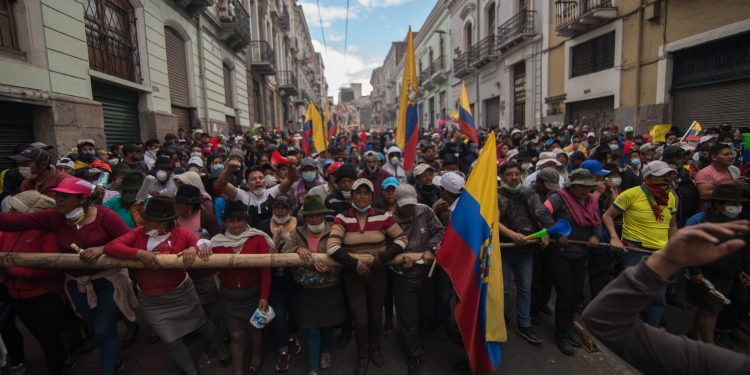QUITO – On the night of June 17, 2022, the President of the Republic, Guillermo Lasso, declared a state of emergency in the three provinces where the protests promoted by the Confederation of Indigenous Nationalities of Ecuador (Conaie) are concentrated.
He announced other measures:
- Increase the human development bond to USD 55.
- Declare the public health system in emergency.
- Double the budget for intercultural education.
- Subsidize up to 50% of the price of urea to small and medium producers.
- BanEcuador will forgive all overdue loans up to USD 3,000.
- Agricultural loans of up to USD 5,000 at 1% and a 30-year term.
- There will be no increase in diesel, gas and extra gasoline and ecopaís.
- There will be no privatization of public services and strategic sectors.
Before concluding his speech, he reiterated the invitation to dialogue with “civil society, doctors, artisans, farmers, carriers, universities, social organizations.” Lasso’s statements come when the country celebrates the fifth day of the national strike promoted by Conaie and supported by various social organizations. These groups have a package of 10 requests awaiting a response from the National Government.
What does the state of exception imply?
The declaration of the state of exception is justified, according to President Guillermo Lasso, by the “serious internal commotion” in the provinces of Pichincha, Cotopaxi and Imbabura. The measure, which will be in force for 30 days, prohibits crowds of people in public spaces in the three provinces during 24 hours. This means that marches and demonstrations are prohibited. In addition, there is a curfew throughout the Metropolitan District of Quito between 10:00 p.m. and 5:00 a.m., starting on Saturday, June 18, 2022. Those who circulate during those hours will be arrested.
The Executive Decree signed by the President states in Article 8 that the following sectors have freedom of movement:
- Public and private health personnel.
- Public and private security, and risk management and emergency services.
- Emergency road services.
- Government and Interior Ministry officials.
- Public servants or contractor personnel who must guarantee the continuity of public services.
- Workers in the logistics chain of the export sector.
- Persons who must travel to and from airports.
- Lawyers who justify the need to travel to a judicial proceeding, officials of the Constitutional Court and employees of the Judiciary.
- Media workers.
- Workers of strategic sectors.
The state of exception also provides for the mobilization of the Armed Forces and the Police, which will be mobilized in the three provinces to maintain public order, the food and hydrocarbons distribution chain. Article 10 of the Executive Decree further clarifies that law enforcement officials “shall observe the progressive use of force” and will depend on the danger or threat to which they are exposed and the level of aggression or resistance presented by the person intervened.
“Lethal force shall be used for the purpose of neutralizing the violent anti-juridical action or lethal aggression of one or several fully identified persons, in the face of imminent threat of death or serious injury,” says the document. The State of Exception also makes viable “the requisitions (seizures, embargoes) that may be necessary to maintain the services that guarantee the rights of the people and the internal order and security”. Meanwhile, the Ministry of Transportation and Public Works must be in charge of immediately clearing the disabled roads in Pichincha, Imbabura and Cotopaxi. Meanwhile, the Ministry of Foreign Affairs will be in charge of controlling foreign citizens participating in the protests.
The indigenous people will not give in
The organizations leading the national strike were not satisfied with the measures announced by President Lasso. Their leaders took three hours to analyze the official chain. Gary Espinosa, president of Fenocin, assured that the President is making a mockery of Ecuadorians with the announcements he made on national chain.
“We invite the comrades to remain firm in the struggle and prepare ourselves for the mobilization to the capital” The state of exception, they said, “is not going to stop us”. And they ratified the indefinite mobilization.
Leonidas Iza, president of Conaie, agreed that the measures announced by Lasso are not the answers they expected. He even described the president as a liar and assured that “he has not been able to manage this crisis”. And although he was in favor of some measures, such as the freezing of the price of gas, diesel or the cancellation of debts, he criticized that “there are no documents” that guarantee the application of the measure. “They are only their words,” he criticized.
He also criticized the declaration of a State of Exception. He accused Lasso of “establishing a dictatorship”. He called on the National Assembly to revoke the executive decree. “We ratify the struggle at national level, indefinitely. From this moment we prepare the mobilization to Quito.” But he told his comrades to avoid “giving pretexts to the Government to impose violence”. This march, he said, must be without confrontation, without violence.
However as it went by, police forces attacked the demonstration and clashes broke out.




